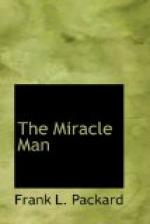The Flopper stirred uneasily.
“Wot’ll I tell him?” asked the Flopper. “He’s waitin’ out dere by de porch.”
“Why—why nothing,” said Helena, and she smiled a little tremulously at the Flopper. “Nothing. I’ll—I’ll go and see him.”
“Say, Helena,” protested the Flopper, “don’t youse—”
But Helena stepped by him now.
“Don’t leave the Patriarch,” she cautioned, turning on the threshold. “I—I won’t be late.”
She passed down the little hall, through the still, quiet room beyond, empty now, through the porch, and out into the night—and then from out the shadows by the row of maples, Thornton came hurriedly toward her, holding out his hands.
“It’s good of you to come, Miss Vail,” he said, in his grave, quiet way. “You must be nearly dead with weariness after last night, and I am afraid I am not very thoughtful—only I—” he broke off suddenly. “Shall we sit here on the bench for a little while, or would you rather walk—I—I have something to say to you.”
It was very dark—the storm of the night before still lingered in a wrack of flying clouds, scurrying one after the other, veiling the stars—and the moon was hidden—and hidden too was the sudden whiteness of Helena’s face. She knew what he had to say, knew it before she had come to him—and yet she was there—and she had come resolutely enough—only now she was afraid.
“I would rather walk a little, I think,” she said. “Here where—where I can be within call. My absence last night seems to have made the Patriarch very uneasy, you know, and—and—let us just walk up and down here beneath the maples in front of the cottage.”




